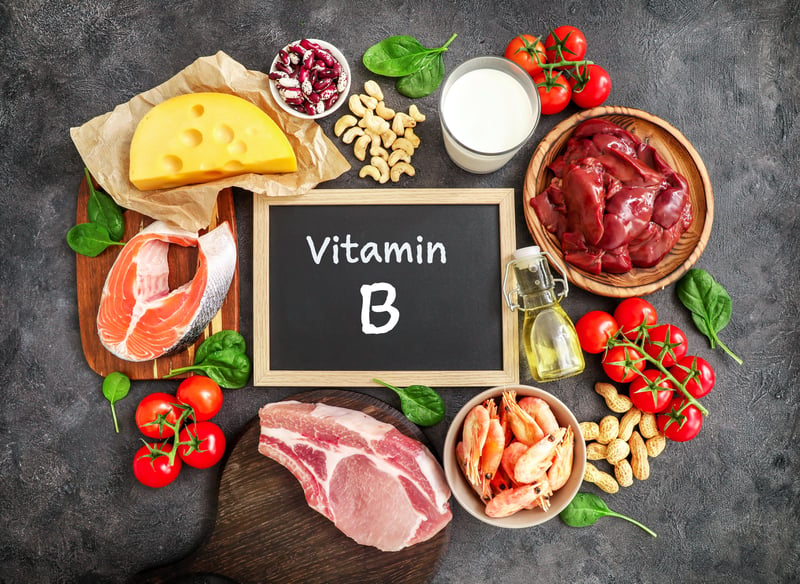Get Healthy!

- Steven Reinberg
- Posted January 19, 2023
The B Vitamins: Put Them on Your A List
B vitamins. These powerhouse nutrients help your cells function at their best, protect your brain and heart, support your immune system and can even improve your mood and energy levels.
This critical class of vitamins needs to be part of a healthy diet.
According to Harvard Health, B vitamins help enzymes do their jobs, including releasing energy from carbohydrates and fat to breaking down amino acids and carrying oxygen and nutrients around the body.
Two of the most essential ones are B6 and B12.
Vitamin B6 (pyridoxine) is found in many foods, but it is also added to foods and supplements. B6 is a coenzyme that helps more than 100 enzymes perform various functions, including the breakdown of proteins, carbohydrates and fats, according to Harvard Health.
Meanwhile, vitamin B12 (cobalamin) is found in meats and fish. It can also be added to foods or supplements. It's needed to make red blood cells and DNA, and it also has a role in the function and development of brain and nerve cells.
What is vitamin B6 good for
B6 helps maintain normal levels of the amino acid homocysteine, high levels of which can cause heart problems. B6 also supports the immune system and keeps the brain healthy.
A recent study published in the journal Human Psychopharmacology: Clinical and Experimental found that taking vitamin B6 supplements may even help relieve depression and anxiety.
"The functioning of the brain relies on a delicate balance between the excitatory neurons that carry information around and inhibitory ones, which prevent runaway activity," study author David Field, an associate professor at the University of Reading's School of Psychology and Clinical Sciences in the United Kingdom, said when the research was published. "Vitamin B6 helps the body produce a specific chemical messenger that inhibits impulses in the brain, and our study links this calming effect with reduced anxiety among the participants."
The Recommended Dietary Allowance of B6 for men aged 14 to 50 is 1.3 milligrams (mg). For those 51 and older, it is 1.7 mg. For women aged 14 to 18, it's 1.2 mg. For women aged 19 to 50 it's 1.3 mg, and for women 51 and over, 1.5 mg. During pregnancy and lactation, the amount increases to 2 mg, Harvard Health says.
Sometimes higher amounts of B6, up to 100 mg, are prescribed. High doses of B6 should only be done under the supervision of a doctor because too much B6 can be toxic.
Too much B6 can cause numbness in the feet and hands, loss of control of body movements and nausea, according to Harvard Health.
Vitamin B6 foods
Vitamin B6 is found in a variety of animal and plant foods:
- Beef liver
- Tuna
- Salmon
- Fortified cereals
- Chickpeas
- Poultry
- Some vegetables and fruits, especially dark leafy greens, bananas, papayas, oranges and cantaloupe
What is vitamin B12 good for
Vitamin B12 helps break down a protein called homocysteine. High levels of homocysteine are linked with an increased risk of heart disease and stroke because it can contribute to the formation of blood clots and free radical cells, and it affects normal blood vessel function. Inadequate vitamin B12 can increase levels of homocysteine.
The Recommended Dietary Allowance for men and women aged 14 and older is 2.4 micrograms (mcg) daily. For pregnancy and lactation, that increases to 2.8 mcg daily, according to Harvard Health.
No upper limit has been set for vitamin B12, as there is no toxic level. However, a recent study in the journal JAMA Network Open suggests that supplements of 25 mcg per day or higher may raise the risk of bone fractures.
On the other hand, vegetarian diets that exclude meat can result in a vitamin B12 deficiency with potentially serious health conditions.
One recent study in the BMJ found that although a vegetarian diet reduced the risk for heart disease, it increased the risk of stroke.
Commenting on the study, Samantha Heller, a senior clinical nutritionist at NYU Langone Medical Center in New York City, said, "Vegans and strict vegetarians need to be mindful of obtaining certain nutrients, such as vitamin B12, vitamin D and omega-3 fatty acids from their diet and supplements."
Heller advised: "You can't go wrong cutting back on red and processed meats such as beef, pork and ham, and adding lentils, chickpeas, tofu, broccoli, spinach or cauliflower to your meals."
Vitamin B12 foods
Foods rich in B12 include:
- Fish, shellfish
- Liver
- Red meat
- Eggs
- Poultry
- Dairy products such as milk, cheese and yogurt
- Fortified nutritional yeast
- Fortified breakfast cereals
- Enriched soy or rice milk







